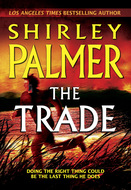Das Buch kann nicht als Datei heruntergeladen werden, kann aber in unserer App oder online auf der Website gelesen werden.
Buch lesen: "The Memory House"
New York Times bestselling author Linda Goodnight welcomes you to Honey Ridge, Tennessee, and a house that’s rich with secrets and brimming with sweet possibilities
Memories of motherhood and marriage are fresh for Julia Presley—though tragedy took away both years ago. Finding comfort in the routine of running the Peach Orchard Inn, she lets the historic, mysterious place fill the voids of love and family. No more pleasure of a man’s gentle kiss. No more joy in hearing a child call her Mommy. Life is calm, unchanging…until a stranger with a young boy and soul-deep secrets shows up in her Tennessee town and disrupts the loneliness of her world.
Julia suspects there’s more to Eli Donovan’s past than his motherless son, Alex. There’s a reason he’s chasing redemption and bent on earning it with a new beginning in Honey Ridge. Offering the guarded man work renovating the inn, she glimpses someone who—like her—has a heart in need of restoration. But with the chance discovery of a dusty stack of love letters buried within the lining of an old trunk, the long-dead ghosts of a Civil War romance envelop Julia and Eli, connecting them to the inn’s violent history and challenging them both to risk facing yesterday’s darkness for a future bright with hope and healing.
Don’t miss any of New York Times bestselling author
Linda Goodnight’s books!
Facebook.com/LindaGoodnightAuthor
You can also find news about Linda’s books and life on her blog:
And be sure to check out her Pinterest page for covers,
photos of her characters and favorite recipes:
The Memory House
A Honey Ridge Novel
Linda Goodnight

I had no way of knowing when I first imagined this book with its theme of grief that I would become intimately acquainted with that excruciating emotion during the writing. With a shattered heart and endless love, I dedicate this book to the memory of Travis Goodnight, the finest son any mother could ever have.
Contents
Cover
Back Cover Text
About the Author
Title Page
Dedication
1
2
3
4
5
6
7
8
9
10
11
12
13
14
15
16
17
18
19
20
21
22
23
24
25
26
27
28
29
30
31
32
33
34
35
36
37
38
39
40
41
42
43
44
Epilogue
Acknowledgments
Reader’s Guide
Questions for Discussion
Copyright
1
“The Child is father of the Man…”
—William Wordsworth
Nashville, Tennessee
Present Day
Freedom was its own kind of prison.
These were the thoughts of Eli Donovan as he scraped drywall mud from his elbow and watched a familiar bronze Buick pull to the curb outside the remodel. With a tug in his gut, Eli tossed the trowel to the ground and straightened. What had he done now?
A man stepped out of the Buick and adjusted his blue tie before squinting toward the house. Their eyes met, held for a fraction of a second until Eli looked down. Once upon a time he would have challenged anyone in a staring contest. Hard time and maturity had changed him. He didn’t want to fight anyone anymore. Certainly not his parole officer.
Saying nothing, Eli started across the greening lawn, past the scattered remains of lumber and construction junk. He was no longer arrogant and proud, but the jitter in his belly shamed him just the same.
“Eli.” Mr. Clifford spoke first, broke the impasse. “How’s it going?”
“Fine.” He stopped two feet from the fortysomething officer of the court, taking in the slight sheen of sweat on the other man’s balding head. Anxious, afraid of tripping himself up, he waited for Clifford to speak his business.
“I had a phone call this morning.”
Still Eli waited, not knowing what to ask or say. If he misspoke, Clifford would get the wrong idea or ask questions Eli couldn’t answer. There were always questions.
The parole officer pulled a paper from his pocket and pushed it toward him. “A woman name of Opal Kimble tracked you down through the warden. She wants to talk to you. Says she has something urgent to discuss. Mentioned the name Mindy.”
Eli stared at the yellow Post-it note, the dread deepening. He licked dry lips, tasted drywall mud. “Mindy?”
“Is there anything I need to know? If you’re into something—”
Eli interrupted. “I’m not. Mindy is an old friend. Did Opal say anything else?”
“No, she just left that number and insisted I contact you. I thought it might be important.”
“Doubtful.” Mindy was a sweet soul. She probably felt sorry for him and wanted to be sure he was all right. He refused to consider the other issue, certain she was better off not hearing from him.
“You could use a friend.”
The comment took Eli aback. In the six months he’d known Pete Clifford, the man had shown him nothing but suspicion, as if he couldn’t wait for the ex-con to step out of line so he could send him back to that stinking rat hole.
“I’m all right.”
“Do you have a phone yet?”
“No.”
Clifford extracted his from a belt holster. “Call her.”
Eli considered only a moment before accepting the offer. No point in riling the man. He could make a call to an old woman he’d never met. Find out what she wanted and then get back to work. He needed the payday.
He took a moment to study the fancy cell phone. A lot had changed since he’d been gone. Technology marched on, as they said, and left the caged behind.
As he tapped in the numbers Eli was gratified when Clifford turned toward his vehicle. “I’ll give you a minute.”
“Thanks.” The word was gravel on Eli’s tongue but he was grateful. He didn’t take acts of kindness lightly.
A woman’s voice, stronger than he’d expected from the aunt Mindy had described as ancient, answered the call.
“Miss Kimble? Eli Donovan.”
“About time you called, boy.”
Her tone stiffened his spine but he remained silent. He focused elsewhere, as he’d learned to do in the difficult moments inside the big house, letting her talk while he only half listened. A pair of courting bluebirds caught Eli’s eye as they dipped and flirted. He smiled a little, though the action felt stiff and unfamiliar. Since his release, he’d been mesmerized by nature. The rising sun, a fluttering butterfly, a dog sniffing tires. Nature brought a peace, a rightness to his tumultuous soul. In his despair and self-pity, he’d forgotten those simple gifts he’d once taken for granted.
In his ear, Opal said something that captured his attention. He tuned back in. “What did you say?”
“I said, Mindy left some things for you and I want you to come get them.”
He frowned toward the horizon where a single gray cloud hovered like a promise of trouble. “Left things? Isn’t she there?”
A beat of silence pulsed in his ear, tightened the knot in his chest.
When Opal spoke again, her tone softened. “I thought you knew. Mindy’s gone.”
“Gone where?” Not that he’d follow or make contact, but the woman was confusing him.
“Gone for good, Eli.” Opal’s voice cracked. “Mindy died.”
2
Peach Orchard Inn
Present Day
She’d kissed him goodbye that last morning. Julia was sure she had. Wasn’t she? The action had been so ingrained in routine. Grab the backpack, stick the lunch box in his hand and kiss him, quick and sweet, before he galloped to the bus stop. She’d watched him get on the bus. She always did, though afterward she’d second-guessed a thousand times. If she’d driven him to school, or if she’d kept him home, because hadn’t he been a sleepyhead that last wonderful, terrible morning?
Six years had passed and yet the horror and grief never left. It was the not knowing that drove Julia Presley quietly mad. In those moments of solitude, especially right before sleep and like now, upon waking, the thoughts would come in rapid-fire succession before she had a chance to block them. She’d become adept at blocking.
Most days she survived and some days she even thrived. But days like today were the worst. Michael’s birthday. He was still alive. She had to believe that. Yet, wondering who had him and what was happening or had happened was too hard to bear. But bear it she did, for what choice did she have? Someday, somewhere, someone would spot him in a crowd or he would simply walk free of his captors and come home. Such miracles still happened, and those children once lost but now found gave Julia hope.
He would be fourteen today, no longer the wide-eyed little boy who hated baths and adored mud puddles. Was he tall and loose limbed like his father, and wouldn’t he be heartbroken to know his mom and dad had unraveled within a year without him? That he was the glue holding their ragged marriage together and that in his absence, they’d been unable to comfort each other? They’d laid blame where none was due, such a stupid reaction to a heinous crime. The only person at fault was the evil being who’d snatched a happy little boy from a peaceful town where nothing bad ever happened. And yet, she felt responsible. Mikey was, after all, her child to guard and guide and she’d failed in that essential role of motherhood.
Dragging herself from beneath the ice-blue duvet, Julia reached first for the iPad on the nightstand. With a poke of a finger, she tapped open the Facebook page where Mikey’s bright eight-year-old face smiled out at her next to a computer-aged photo. Would he really look like this today?
She trolled the comments, saw the handful of birthday wishes and closed the program with a sigh. No news. No sightings. Just like every day since she’d started the page with the help of a support group. Other mothers who waited for their children to come home. Most days she didn’t visit the forums for idle conversation. They depressed her, and Lord knew she couldn’t go back down that dark tunnel again.
With a breathed plea for strength to get through another day, Julia dressed and dabbed makeup on the shadowy half-moons beneath her eyes. Though dawn had yet to break, she had to get up and get moving. She had guests to attend, breakfast to cook and a myriad other tasks to address. Keeping busy was important, soothing therapy. Culinary therapy, she termed her cooking obsession. If she worked herself into exhaustion, she could sleep without the oppressive dreams.
She was thankful every day for the rather inexplicable purchase four years ago of Peach Orchard Inn, this big, old oddity of a Southern mansion, now a guesthouse. There was something benevolent about the two-story structure that had survived a Civil War and the century and a half since. The day Valery had dragged her out here “just to look,” the house had wrapped itself around her like a warm hug. Though cobwebs and dust had covered everything, her heart had leaped. For the first time in months—years—she’d felt something other than despair. This wonderful old bed-and-breakfast had, quite literally, saved her sanity. She’d yet to understand why. It simply had.
She’d clung to her former home on Sage Street—Mikey’s home—too long, fearing her son would return and find her gone, but she was dying there. Depressed, barely able to get out of bed each morning, and some days she didn’t get up at all. Since a dead mother was not what she wanted her son to come home to, at her family’s urging Julia had sold the modern brick home and moved into a piece of history sorely in need of restoration. In that way, she and the house were the same.
Everyone in Honey Ridge knew about Mikey’s disappearance, but most were Southern enough to speak of the loss only among themselves and never to her. She was left alone and they, along with her family, pretended that she was a normal person, an ordinary divorced businesswoman running a guest inn and clinging to history—her own and that of this antebellum house.
She was stuck in the past, both in the distant and the near. Stuck. In freeze-frame for six years, waiting, unable to move forward, unwilling to give up that gossamer thread of hope that one day she’d awaken and Mikey’s disappearance would only have been a nightmare.
Bingo, the aging Australian shepherd, rose from his rug at the foot of her bed. When Julia paused to give his blue-merle head a rub, she spotted an object on the floor where he’d slept. At first she thought it was a rock and bent to pick it up, puzzling to discover another smooth, round child’s marble. Not an ordinary, modern marble. This one was reddish in color, made of clay, a handmade antique like the others she’d discovered in the house.
“Did you bring this in here, Bingo?” He was forever bringing her little gifts. “Better than the dead snake you brought last time.”
She rolled the child’s toy in her palm, wondering. She and Valery had found a number of interesting and historic items during the ongoing remodel, each one adding another layer of mystery and history to the old inn. But the marbles were different. They showed up randomly, usually in a place she’d recently cleaned and always on a bad day. They spoke to her, comforted her, and wouldn’t Mama have a fit to hear that her unbalanced daughter was now communing with marbles.
“She’d say I’ve lost my marbles.” Maybe she had.
Grasping comfort where she could, Julia slipped the little clay ball into her pocket and started toward the kitchen.
Bingo trotted by her side past the wide stairs that led from floor to floor. Though not as grand as the one in Gone with the Wind, the staircase had captivated Julia on sight. She imagined a nineteenth-century bride sweeping down these now burgundy carpeted stairs, one gloved hand on the gleaming oak banister as her heart canted toward her true love waiting next to the enormous marble fireplace in the parlor below.
Fantasy, yes, like the comforting marbles, but a house like this allowed a certain imaginative license. Part of a Southern upbringing is to believe history lingers in walls and whispers from ancient oaks, and though she believed in so little these days, she believed that. This house was a living entity and Julia had carefully listened as she and Valery worked to create an inn worthy of a special trip to a small town in rural Tennessee. An inn where others might find peace even if the owner couldn’t.
Sometimes, when she sat on the enormous wraparound porch, Julia thought she heard the rattle of carriages and horse hooves between the double row of old magnolias. She was careful to tell no one about the incidents. Nor of the time she’d felt a cool, soothing hand on her forehead after a screaming nightmare about Mikey; nor of the little boy’s laughter she sometimes imagined in the upper hallway. A woman with a slender hold on sanity had to be careful about her wild imagination, for that is all it was. Julia didn’t believe in ghosts or spirits or even much in God anymore.
She’d once made the mistake of sharing one of the episodes with Valery, a confession that had driven her sister to the liquor cabinet. That was a move Julia did not want to repeat. Valery and liquor were a troubling pair, especially since her sister’s latest battles with Jed the jerk, the worst boyfriend in history.
Though she and Valery were close, Julia had learned to keep her thoughts and grief to herself. No one understood. They expected her to move on and forget she’d had a son, a husband, a family. To forget she’d had a happy, almost perfect life until that horrible October morning.
Rounding into the kitchen, a late addition to the house, Julia flipped on lights and went straight for the coffee and oven dials. She might never win any chef awards but she loved to feed people.
Though her specialty was peach tea made from scratch, her coffee was good, too, a unique blend she ground herself and served French press. Guests were known to linger for hours over coffee, so she started there. The breakfast menu varied but always included a peach dish, mostly with fruit from her orchard. People expected peaches from an inn with a name like Peach Orchard.
In minutes, the ham-and-egg strata was ready for the oven, the peach-muffin batter spread among the tins, and the coffee sang its aromatic siren song. Taking a cup, Julia went out onto the front porch for her favorite time of day. With only the dog for company, she sat in one of four white wicker chairs to watch the sun break over the lawn and come sneaking through the waxy-leaved magnolias and fuchsia rhododendron. Last night’s rain glistened like tiny crystals on the verdant grass while Old Glory hung limply from the white-board porch rail.
Julia made a frustrated sound in the back of her throat. Valery had forgotten to bring in the flag again last night, a clear breach of etiquette that would have the townspeople on the phone if anyone had driven past. Hopefully, no one had. Backed by woods, Peach Orchard Inn was off the main thoroughfare on the edge of town. Mikey would have loved this place. Room to run and explore and be a little boy in safety.
But safe was a relative term.
The house was shielded from the road by a thick stand of leafy trees, including the showy pink blooms of the peach orchard that ran to the right of the front lawn and down the north side. Sometimes she heard a car go by but mostly not. The small-town peace and quiet was one of the draws of her little guesthouse.
Julia propped her heels on a neighboring chair, gazed out toward the orchard and sipped her coffee.
“Happy birthday, baby,” she whispered, and the hollow heat of grief seized up in her chest. Eyes closed, she heard his small voice, smelled his little-boy and toothpaste scent and felt the warmth of his sturdy body as she’d hugged him that final time. Her throat thickened and tears welled. She’d grieve for these few minutes alone, as she had for six years, and then she’d dust off her hostess smile and get on with her day.
Bingo padded to her knees and whined, nudging. The Aussie didn’t want anyone to be unhappy, though he had endured his share of her tears. He, too, had grieved, wandering forlorn for weeks in search of the adored boy who never came home.
Leaning forward, Julia wrapped her arms around the dog, pressed her face to his fur and wept.
“Ma’am. Are you all right?”
Julia jerked upright and dropped her feet to the porch with a thud. Her heart beat in her throat as she stared at a man standing at the bottom of the steps. She glanced behind him, saw no car and wondered where he had come from. He hadn’t been there a moment ago. Her errant thoughts of rattling carriages, talking marbles and touches in the night had her wondering if she’d imagined him, conjured him up. Was she hallucinating? He was handsome enough to be a dream but hard looking, too, as if he’d seen too much and done even more. A dark-eyed pirate in a tattered jean jacket with a day’s growth of beard, shaggy black hair and a rumpled white T-shirt.
“Who are you?” The words were breathy, harsh and out of character for a Southern hostess.
A frown formed a vee between the man’s Faustian black eyebrows. “I didn’t mean to scare you. You were crying.”
She realized then that her face was still wet. “I’m fine.” She swiped both hands across her cheeks in one quick motion. “Where did you come from?”
He jerked a thumb over his shoulder. “The road. My car broke down. You wouldn’t have any jumper cables, would you?”
“Sorry, no.”
He glanced toward the section of the peach orchard that ran parallel to the house. His shoulders lifted in a hopeless sigh.
“Could I use your phone?” He asked as if expecting a denial.
“Don’t you have a cell?”
His jaw flexed, hardened even more. His eyes cut to hers and just as quickly cut away. “No.”
Everyone had a cell phone these days. Where had this guy been? The moon?
She heard a slight noise from inside the kitchen and knew her guests had begun to stir.
“The phone is in the kitchen. Come in.” She turned, felt his eyes at her back as she reached for the screen door. With a silent move that could have been unsettling, he joined her, took hold of the door and held it open as she entered.
She wasn’t afraid of him. But even if he’d been an ax murderer, she’d not have been afraid. A person who was dead on the inside had no fear.
One of her frequent guests, a bespectacled sixtysomething Bob Oliver, stood at the counter helping himself to coffee. He and his wife had been here so often in the past two years, she let them have the run of the place and was glad they felt relaxed. That was the point of Peach Orchard Inn.
“Good morning, Bob,” she said. “You’re up with the birds.”
“I smelled your coffee.”
She managed a smile. “I’ll fix a carafe for Mattie too.”
“Later, maybe. Seven is too early for Mattie. When she retired from teaching she said she was never setting another alarm. And she hasn’t.”
“Can’t blame her for that,” Julia offered before turning toward the man who stood uncertainly beside the back door.
Before she could point the stranger toward the landline, Bob said in his usual candid manner, “Didn’t know you had a hired man now.”
Julia slanted the stranger a glance, wondering if he’d been insulted. His hard face remained impassive.
“Unfortunately, help, other than Valery, is still a pipe dream for Peach Orchard Inn. His car broke down up on the road.”
“Probably the battery,” the newcomer said, and then as if he’d been reprimanded for speaking too loudly, he looked down at his feet.
“Is that so? Maybe I can help.” The older man offered a hand. “Name’s Bob Oliver.”
The stranger looked at the outstretched hand for an extra beat—long enough to draw attention to the hesitation—before he reciprocated. “Eli Donovan. I’ll take you up on that, Mr. Oliver.”
“Call me Bob. Mr. Oliver sounds like a professor of physics—which I was for thirty years. Now, I’m just plain old Bob.” He chuckled and reached for the silver carafe, giving the plunger a push with the flat of one hand. “Julia here makes fine coffee.”
The stranger flicked a glance at her but said nothing. She should offer. Offering coffee was the hospitable thing to do. “Would you care for a cup?”
He swallowed, seemed troubled by the simple question. “If you wouldn’t mind.”
She poured another cup and handed him the aromatic brew. His fingers trembled the slightest bit, but he quickly wrapped them around the mug while Julia pretended not to notice.
What she did notice was the fatigue around his eyes, the sheer weariness of the man. She noticed, too, that he was fit and muscled, his hands clean but rough, as if he labored for a living. He wore no jewelry, not even a wedding ring, though why she would notice bothered her a little. Good-looking men were not necessarily decent human beings, and even if he was the nicest guy on the planet, she was too empty to be interested.
“The telephone is over there if you still want to make a call.” She motioned to the landline on the brown granite counter and moved to check the casserole.
Mr. Oliver waved her off. “No need. I have jumper cables in my trunk. Never make a road trip without them.”
The stranger’s quick eyes moved from her to Mr. Oliver as if assessing both and wondering what to make of their friendliness. He was like a caged panther, dark and wary and dangerous.
“We’ll drive my car up there,” Bob said. “Give you a jump and have you on the road in a jiffy.”
“Thanks.” Eli Donovan took a brief sip of coffee and moved to set the still-full mug on the counter.
“Take the coffee with you.” Julia gestured between the two men. “Both of you.”
Eli hesitated. “Your cup…”
“Is returnable.”
“Oh. Thanks.” The word was rusty in his throat, as if he didn’t say it often. In fact, all his words were rusty, careful.
Bob clapped him on the shoulder. Julia couldn’t help noticing the way Eli tensed. “Today’s your lucky day, Eli. Good coffee from a pretty lady and a man who never leaves home without tools. My car’s parked around back. Ready when you are.”
“I’m ready.”
From the corner of her eye, Julia watched the two men exit her kitchen, their feet thudding against the board veranda. Eli carefully balanced his coffee, sipping as he walked, and Julia could hear Mr. Oliver, in his perky professor voice, chattering away while the other man remained silent.
Bingo trotted around the gravel walkway behind the pair, happy to have a purpose, abandoning his mistress to the quiet smells of her kitchen.
Julia wiped her hands on a peach-imprinted dish towel and went to the door, watching as Bob Oliver and Eli Donovan disappeared around the corner of the porch.
What a strange morning. Another marble from nowhere, and now a disturbing stranger. Both on Mikey’s birthday.
She reached into her pocket, withdrew the marble and rolled an index finger over the smooth clay. Somewhere in her distant memory, a little boy laughed.








